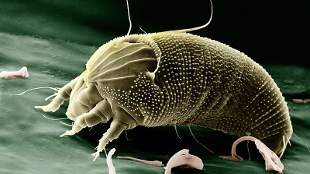 Rust Mite (Aceria anthocoptes) Wikimedia Commons, LycaonFighting for survival in a shared habitat, some mites kill the young of rival species, both to consume as food and to reduce competition for their own offspring. But mites that survive such attacks hold a grudge, according to a study published this week (October 11) in Scientific Reports. When previously assaulted juveniles reach adulthood, they attacked juveniles of the opposing species—their former tormentors—more often than those that had not been attacked as youngsters did.
Rust Mite (Aceria anthocoptes) Wikimedia Commons, LycaonFighting for survival in a shared habitat, some mites kill the young of rival species, both to consume as food and to reduce competition for their own offspring. But mites that survive such attacks hold a grudge, according to a study published this week (October 11) in Scientific Reports. When previously assaulted juveniles reach adulthood, they attacked juveniles of the opposing species—their former tormentors—more often than those that had not been attacked as youngsters did.
Working in the lab, an international team of biologists led by Arne Janssen at the University of Amsterdam observed the behaviour of Berlese mites (Iphiseius degenerans) and Oudemans mites (Neoseiulus cucumeris), “reciprocal predators” that feed on the juveniles of the other species even when other food is available.
Designating the Berlese mites as “prey” and the Oudemans mites as “predators” for the sake of the study, the researchers noticed that when Berlese mites that had been assaulted as juveniles grew into adults, they attacked juvenile Oudemens mites more frequently than those that had not been exposed to predation when young. When adult Berlese mites were attacked, however, it made no difference to their behavior, suggesting that predation during early life caused the animals to retaliate.
...





















